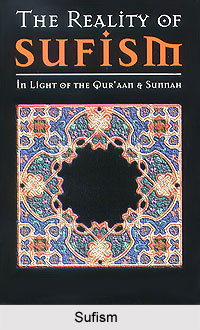 Sufism entwined with its philosophy, doctrines, isms and mythos is reckoned as "a science whose objective is the reparation of the heart and turning it away from all else but God". It is an amalgamation of science art and philosophy through which learns how to "travel into the presence of the Divine, purify one`s inner self from filth, and beautify it with a variety of praiseworthy traits."
Sufism entwined with its philosophy, doctrines, isms and mythos is reckoned as "a science whose objective is the reparation of the heart and turning it away from all else but God". It is an amalgamation of science art and philosophy through which learns how to "travel into the presence of the Divine, purify one`s inner self from filth, and beautify it with a variety of praiseworthy traits."
The history of Sufism is rich and it has already travelled a long path before the subsequent institutionalization of Sufi teachings into devotional orders in the early middle Ages. The chains of transmission of almost all the extant Sufi orders can be traced back to the Prophet Muhammad via his cousin and son-in-law, Ali. However, the only notable exception to this rule is the Naqshbandi order, as the origin of its teachings traces from the Prophet Muhammad to the first Islamic Caliph Abu Bakr. There have been a number of different devotional styles and traditions of Sufism developed over time and they reflected the perspectives of different masters and the cumulated cultural wisdom of the orders. Almost all of these styles and traditions have concerned themselves with the understanding of subtle knowledge, education of the heart for purifying it of more basic instincts. They also concerned themselves with the love of God, and they approached God through a well-described hierarchy of enduring spiritual stations and more impermanent spiritual states.
According to the traditional Sufi point of view, the esoteric teachings of Sufism were actually transmitted from the Prophet Muhammad to those who had the capacity of acquiring the direct experiential subtle knowledge of God. The knowledge was passed on from teacher to student through the centuries. While, most of this transmission is not summarized in texts, some of them are. The people like Uwais al-Qarni, Harrm bin Hian, Hasan Basri and Sayid ibn al-Mussib are regarded as the first Sufis in the earliest generations of Islam, who have made important contributions in Sufi writing. Harith al-Muhasibi is considered to be the first one to write about moral psychology and Rabia Basri was a Sufi, famous for her love and passion for God. She expressed her thoughts and affection to God through her poetry. Bayazid Bastami was also considered to be among the first theorists of Sufism
The philosophy of Sufism and its growth has played a definitive role in the spread of Islam and also in the creation of integrally Islamic cultures, especially in the continents of Africa and Asia. Sufism produced a flourishing intellectual culture throughout the Islamic world between the 13th and 16th centuries CE. This intellectual culture was considered as a sort of "Golden Age" and the physical artifacts of the culture are still present. There can be found a lodge (known variously as a zaouia, khanqah, or tekke) in many places that is endowed through a pious foundation in perpetuity (waqf) to provide a gathering place for Sufi adepts. The lodge also provides lodging for the itinerant seekers of knowledge. Some of the lodges also contained kitchens where these seekers could serve the poor and/or complete a period of initiation, a library, and other structures. In fact, there was not a single important domain in the civilization of Islam that could remain unaffected by the Sufi philosophy in this period.
Sufism hence can be called as the passing of ordinary limitations. The classical Sufi authors with their philosophy, the mythos and ideology of the orders of Sufism and finally the morals of the Sufi stories all played a great part in spreading Sufism whilst making it a doctrine, a philosophy of immense importance.



















